NewsBeat
Southport stabbing: Everything we know about attack as Axel Rudakubana to be sentenced

Axel Rudakubana has admitted to killing three girls at a dance class in Southport on the first day of his trial. The 18-year-old was to stand trial at Liverpool Crown Court on Monday charged with 16 offences, including three counts of murder and 10 counts of attempted murder.
Dramatically changing his plea at the last moment, the teenager admitted to all the charges. He pleaded guilty to the murders of Bebe King, six, Elsie Dot Stancombe, seven, and Alice da Silva Aguiar, nine. He also admitted to possessing terrorist material and producing the toxin ricin.
Rudakubana will be sentenced on Thursday, Mr Justice Goose said in court. He told the teenager that it would be inevitable that a life sentence equivalent would be imposed upon him.
The judge also apologised to the families of the victims who, because of Rudakubana’s surprise guilty plea, were not in court to see his admission.
Here’s everything we know about the devastating Southport attack of July 2024.
What did Axel Rudakubana do?
On the morning of 29 July 2024, then 17-year-old Axel Rudakubana travelled from his home village of Banks in Lancashire via taxi. He was then seen calmly exiting the vehicle and entering the dance studio on Hart Street.
In just minutes, witnesses would describe seeing young girls being carried out of the building covered in blood with stab wounds to their backs, while their screaming parents rushed to find them.
Advertised for children aged between years 2 and 6 at primary school, the summer event quickly turned to “a scene from a horror movie”, with an enormous emergency incident declared.
Bebe and Elsie both died at the scene. Alice died in hospital the day after the incident.

Ten others were injured, including eight children, yoga teacher Leanne Lucas and businessman John Hayes, who both had heroically attempted to prevent the attack.
He has now pleaded guilty to all charges of murder and attempted murder, as well as terror-related offences. He was found to have a PDF file titled “Military Studies in the Jihad Against the Tyrants: The Al-Qaeda Training Manual” and charged with possessing information likely to be useful to a person committing or preparing an act of terrorism.
What happened after the attack?
Shortly after the murders, violent riots broke out across the country. These were fuelled by far-right misinformation online which claimed that Rudakubana – whose identity was not yet public – was a Muslim and asylum seeker. Much of the violence was targeted towards Muslim and migrant communities.
Over the course of six days, the rioting became the largest incident of social unrest in the UK since the 2011 riots. Attempting to tackle the violence, around 130 police officers were injured. By September, 1,280 arrests had been made, with 800 charged.

In the months since his crime and the subsequent riots, Rudakubana had remained consistently silent in the dock, with prosecutors and investigators compiling CCTV and witness statements to establish the case against him.
In a previous appearance, the court heard that Rudakubana had been diagnosed with autism spectrum disorder, and had refused to engage with a psychiatrist at a police station. In the period leading up to the attack, he had also been unwilling to communicate with his family and had not been leaving the house.
Rudakubana’s not-guilty pleas were entered on his behalf in December 2024, as he chose not to speak. But as each charge was read to him on 20 January this year, the teenager quietly said “guilty” to each count.
Public inquiry
The home secretary announced on Monday that there will be a public inquiry into how Rudakubana “came to be so dangerous” and why Prevent “failed to identify the terrible risk” he posed to others.
Yvette Cooper confirmed the 18-year-old had “contact with a range of different state agencies throughout his teenage years” before carrying out his “meticulously planned rampage”.
Ms Cooper said in a statement: “He was referred three times to the Prevent programme between December 2019 and April 2021 aged 13 and 14.
“He also had contact with the police, the courts, the Youth Justice system, social services and mental health services.
“Yet between them, those agencies failed to identify the terrible risk and danger to others that he posed.”
Announcing the public inquiry, the Home Secretary continued: “Although, in line with CPS advice to preserve the integrity of the prosecution, we were constrained in what we were able to say at the time, the Home Office commissioned an urgent Prevent Learning Review during the summer into the three referrals that took place and why they were closed.
“We will publish further details this week, alongside new reforms to the Prevent programme.
“But we also need more independent answers on both Prevent and all the other agencies that came into contact with this extremely violent teenager as well as answers on how he came to be so dangerous, including through a public inquiry that can get to the truth about what happened and what needs to change.”
NewsBeat
Urgent health warning to anyone who uses hot water bottles

A woman has urged others to “never use” hot water bottles after her seven-year-old bottle exploded leaving her with third-degree burns.
Karen O’Brien, a 52-year-old retail worker who lives in Melton Mowbray, Leicestershire, with her husband Daniel, 64, and their two children, suffered severe burns when her hot water bottle burst on her lap in March 2024.
The injury caused her skin to blister and peel away leaving “holes in the skin” that worsened by the hour.
At Leicester Royal Infirmary Hospital, doctors removed layers of damaged skin to prevent infection. The burn left her with a large scar on her thigh and permanent skin discolouration.
O’Brien is now warning others to avoid hot water bottles, and if they are using them to check the age.

Hot water bottles perish over time so experts advise to change bottles every two to three years.
If you cannot remember when you bought your bottle, it will have a flower on or near the neck – the number in the middle is the year the bottle was made.
The petals represent months and the dots weeks, for example if there are three dots in the first petal it was made toward the end of January of that year.

“I’ve never known pain like it, it was horrendous,” she said.
“When I first could see the skin, I had blisters coming up straight away, and then you could see where the skin just melted away.
“I pulled my trousers down, and as I did that, I could see the skin coming away with my trousers.
“There were holes in the skin but every hour it was looking worse and worse and worse.
“At first I thought, ‘OK, I know I’ve done some damage here’ but it didn’t look that bad.
“After this, I found out you are supposed to replace (hot water bottles) after around a year, and a lot of them have the date they were manufactured on them… mine might have burst because it was so old.”

O’Brien now has a “big scar” and skin discolouration on the area and if she is cold, the area often goes “bright red”.
She said she is now “so wary” of dealing with anything hot, whether it be making herself a hot drink or cooking.
To people who use hot water bottles, she said: “Never, ever use them, especially don’t give them to children, they are too dangerous.
“My husband’s bought me a battery-powered fleece that keeps me warm so I don’t need to use a hot water bottle.”
NewsBeat
ChatGPT down as thousands report issues worldwide

Thousands of people have reported they are unable to use the world’s best-known artificial intelligence (AI) tool, ChatGPT
Downdetector, which tracks website outages, showed more than 10,000 people reported the AI chatbot, which is made by OpenAI, was not working in the UK on Thursday.
Users attempting to use it were met with a message reading “the web server reported a bad gateway error”.
OpenAI has not yet publicly commented on the outage. The BBC has contacted the firm for comment.
However, many people have taken to social media to highlight the problem and the disruption it is causing them.
The outage began around 11:00 GMT on Thursday, and users continue to report issues.
ChatGPT’s status page said the app had been “experiencing elevated error rates” and the firm was “currently investigating”.
Though many people use the free version of the chatbot, the firm charges up to $200 per month for its various membership tiers.
OpenAI boss Sam Altman said in December that ChatGPT is used weekly by more than 300 million people worldwide.
It comes after tech firms including OpenAI pledged a $500bn (£405bn) investment into AI infrastructure in the US.
Politics
Reform UK: Chairman Zia Yusuf REJECTS Suella Braverman’s offer of a Tory-Reform pact: ‘Betrayed British people!’

Reform UK chairman Zia Yusuf has expressed disappointment at Suella Braverman’s suggestion for an electoral pact between the populist party and the Conservatives.
Speaking on GB News, Yusuf firmly rejected any possibility of a deal with the Tories, questioning how Reform could work with a group that “deal entirely in deception, in falsehoods, and betrayal”.
Yusuf’s comments came after the former Home Secretary called for unity on the right during a visit to Washington DC for Donald Trump’s inauguration.
Speaking on GB News, Yusuf said: “I agree with her that there isn’t space for two, and the reality is Reform has already overtaken the Conservative Party.

Zia Yousef said that Reform will never have a pact with the Tories
GB News
“Look, how can you do a deal? How can you do a pact with a group, with a tribe who deal entirely in deception, in falsehoods, and betrayal?
“They have betrayed the people of Britain to such an extraordinary degree that they will fully deserve the extinction event that’s now facing them.
LATEST DEVELOPMENTS
“The pollsters have a great deal of discretion to flex things up and down and none of the pollsters want to go first, because pollsters largely have no interest in being correct. They just want to not be demonstrably wrong. You’ll see in the coming weeks, Reform surging ahead of the Tory party, as we already have done in several polls.
“But look, just look at the Tories’ track record here. Over the 14 years that they were in government, they grew the size of the population of the United Kingdom by six and a half million people.

Suella Braverman suggested a pact between the parties
PA
“They built no new net prison places, which is why we have violent criminals running rampant around the United Kingdom and people feel terrified to leave their homes, particularly women. The 2010, the 2015, the 2017, and the 2019 manifesto, they promised to bring that migration down to the tens of thousands. What did they do? They left office with that number at one million.”
He added: “We will never do a deal with the Tory party, because they will never again get a chance to betray the British.”
Braverman made her comments while attending Trump’s inauguration in Washington DC, where she praised the former President’s style of “unfiltered conservatism”.”
“Donald Trump has not just shifted Overton window, he’s shattered it,” Braverman told The Telegraph.

Zia Yousef said the Tories have “betrayed the British people”
GB News
“He’s made the unsayable mainstream and he’s made the radical much more acceptable to the moderates.”
Braverman added she was open to various forms of cooperation, including “a merger, a coalition, a supply and confidence agreement, or a non-aggression pact”.
The former Home Secretary also aligned herself with Reform UK’s position on leaving the European Convention on Human Rights.
NewsBeat
Prince Harry’s legal battles: Who is the duke still taking against and which cases are settled?

The Duke of Sussex settled his legal action against the publishers of The Sun newspaper on Wednesday, receiving a rumoured eight-figure settlement and a “full and unequivocal apology” for intrusion into his private life.
It has been described as a “monumental victory” for Prince Harry against the British press and came after he secured a separate victory against the publishers behind The Mirror in 2023.
But his legal battles are not yet over, as he is still engaged in two other high-profile cases in the British courts against the Home Office and publishers of the Daily Mail.
Here is an explanation of all of Harry’s past and present legal battles:

What cases are over?
Mirror Group Newspapers (MGN)
In 2023, the High Court ruled in Harry’s favour in his case against the publishers of The Daily Mirror.
A 386-page judgment found that “extensive” phone hacking had taken place at Mirror Group Newspapers (MGN) titles over several years. This included phone hacking, “blagging” (gaining information by deception), and the use of private investigators for unlawful activities.
The court ruled that the practice was “widespread and habitual” at the Daily Mirror.
The case against MGN was heard over a seven-week trial and included testimony from Harry, alongside other representative claimants.
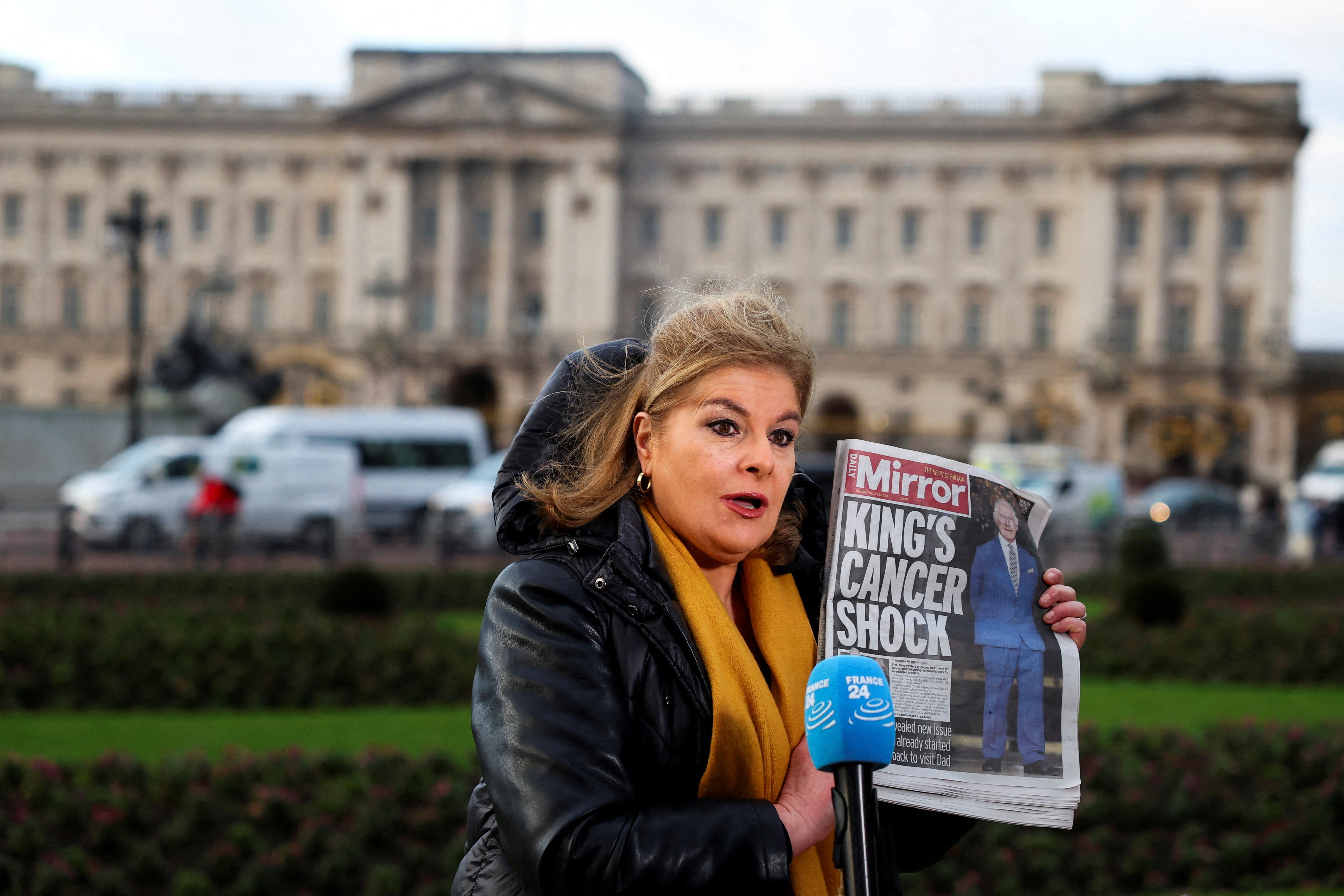
News Group Newspapers (NGN)
On Wednesday, a line was drawn under Harry’s five year legal battle against the publishers of The Sun newspaper, News Group Newspapers (NGN).
The duke settled with the publishers after eleventh-hour discussions on the day his high-stakes trial was set to begin on Tuesday.
Though he did not technically win the case in a court of law, it marked a “monumental victory” for the duke as he received an apology for many of the claims he made against the publisher a “substantial” sum for damages.
NGN, a subsidiary of News UK owned by Rupert Murdoch’s News Corp, said it offered a “full and unequivocal apology to the Duke of Sussex” for “serious intrusion” by The Sun and for phone hacking by private investigators working for the News of the World.

What cases are ongoing?
Associated Newspapers Limited (ANL)
Harry’s case against the publishers of the Daily Mail for unlawful information gathering could go to trial in early 2026.
The Duke of Sussex has accused the publisher of allegedly commissioning unlawful activities, including hiring private investigators to place listening devices inside cars, recording private phone conversations “blagging” private records, and even burglaries to order.
He is among a group of high-profile individuals fighting the case, including Stephen Lawrence’s mother, Baroness Doreen Lawrence, Sir Elton John and his husband David Furnish, actresses Sadie Frost and Liz Hurley, and politician Sir Simon Hughes.
The group is bringing legal action against Associated Newspapers Limited (ANL), which firmly denies the allegations, previously telling the court that they are “lurid” and “simply preposterous.

The Home Office
Harry took legal action against the Home Office over the February 2020 decision to change the level of his personal security when he visits the UK.
In a judgment last February, retired High Court judge Sir Peter Lane rejected the duke’s case and concluded Ravec’s approach was not irrational nor procedurally unfair.
However, the Court of Appeal said in June last year that it will hear his challenge following a direct application from Harry’s lawyers, who said Harry had been granted permission to appeal.
However, the Court of Appeal has now said it will hear his challenge following a direct application from Harry’s lawyers, who said Harry had been granted permission to appeal.
The appeal is now expected to be heard in the spring.
Politics
Common Sense with Robert Jenrick
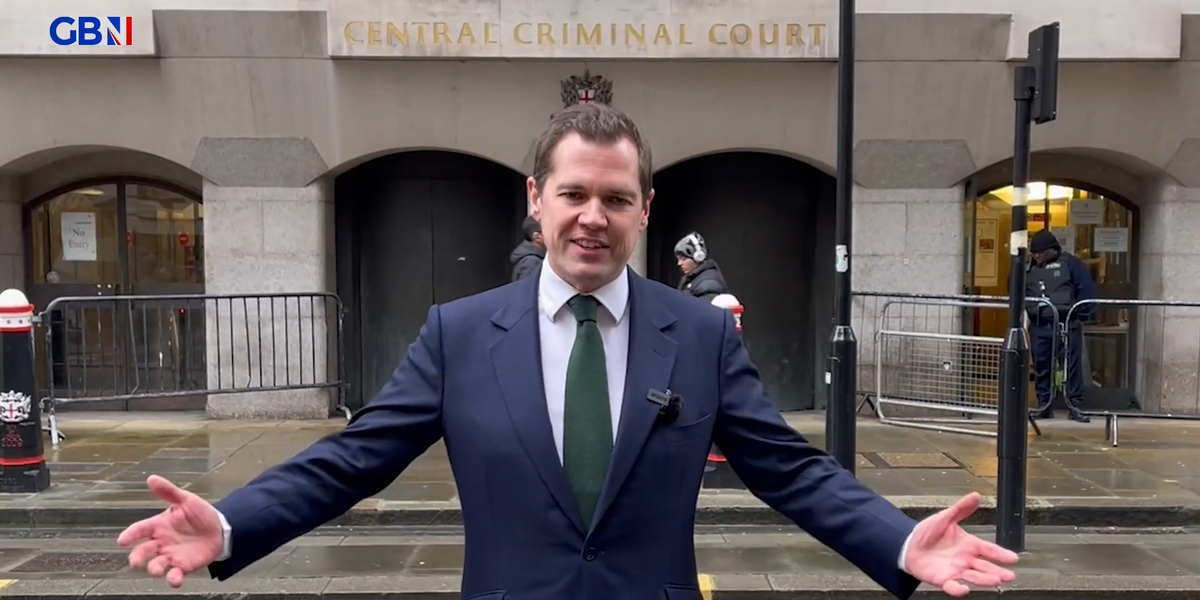

Robert Jenrick has highlighted a severe crisis in England’s court system in his latest episode of Common Sense.
He explained that nearly half of all courtrooms at London’s Central Criminal Court are currently empty in a shocking revelation.
Speaking outside the Old Bailey, Jenrick pointed to 11 vacant courtrooms in the building, describing it as “the beating heart of our legal system”.
The situation is even more dire in Carlisle, where 67 per cent of courtrooms stand empty, while Bristol sees 40 per cent of its courtrooms unused on average each week.
The court system is facing a mounting crisis with a backlog of 73,000 cases, which is increasing by 500 cases every month.
In episode two, Jenrick speaks to James from the Criminal Bar Association, and highlights “the right to a fair trial in a reasonable time frame”.
Watch the second episode of ‘Common Sense with Robert Jenrick’ above
NewsBeat
Could you pass a Cambridge English exam from 1913?
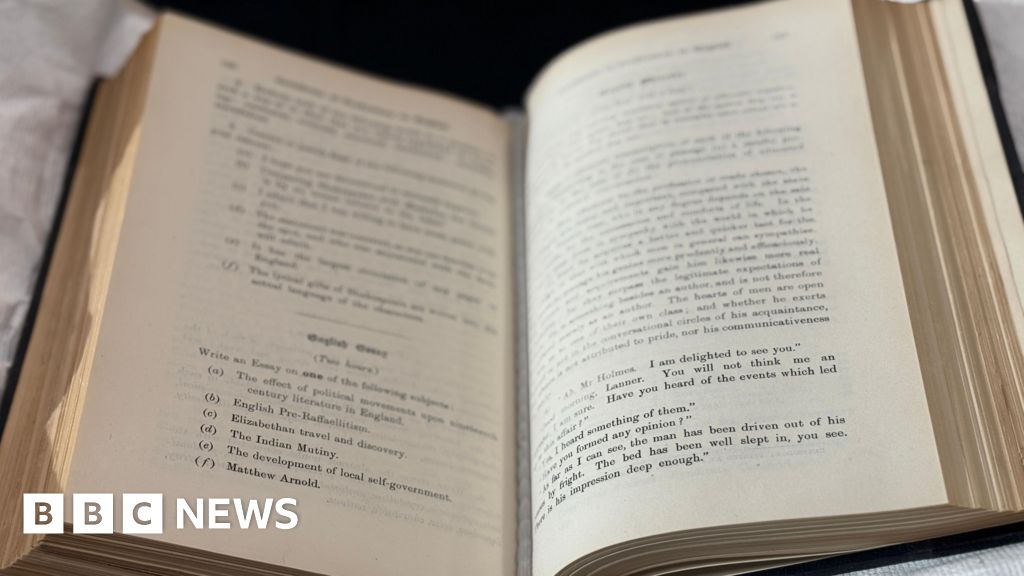
BBC News correspondent, East of England
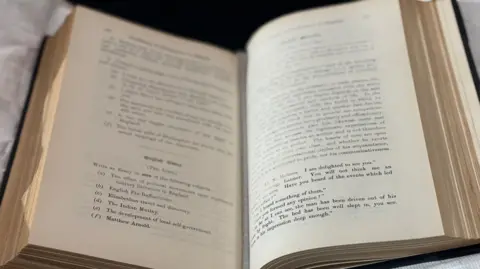 BBC
BBCDo you remember the feeling of sitting an exam? The halls crammed with desks and the sound of the ticking clock. Cambridge University Press and Assessment (CUP&A), one of the UK’s biggest exam providers, has been setting papers since the 1850s and its English exams have now been taken by more than 100 million people around the world. But today’s exam is very different to that very first paper.

In 1913, three people sat down to take the first Cambridge English exam. They were all teachers and all of them failed. But would you? This is one of the questions – you can find the answers at the end.
Correct or justify four of the following sentences, giving your reasons:
(a) I hope you are determined to seriously improve.
(b) Comparing Shakespeare with Aeschylus, the former is by no means inferior to the latter.
(c) I admit that I was willing to have made peace with you.
(d) The statement was incorrect, as any one familiar with the spot, and who was acquainted with the facts, will admit.
(e) It has the largest circulation of any paper in England.
(f) The lyrical gifts of Shakespeare are woven into the actual language of the characters.
The exam comprised a series of papers on phonetics, grammar, and translation, which took 12 hours to complete.
“At first, it was an exam for a small elite who wanted to study English as an academic subject, like Latin or Ancient Greek,” says Dr Evelina Galaczi, director of research at CUP&A.
“At the time, grammar and translation were considered the most important thing, but now the exam is much more about using English to communicate.
“The shift was gradual, but in the Second World War English became a global language and so speaking and pronunciation became much more important.
“That was a catalyst for change, and I firmly believe that learning English opens doors.”
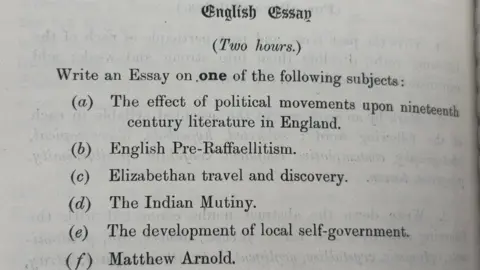
By the 1950s, there had been requests for the English exam to offer translation questions in dozens of different languages, ranging from Arabic to Vietnamese.
Gillian Cooke, group archivist at CUP&A, said: ” I think the take up for each language was quite small and so that probably wasn’t cost effective.
“It might be one of the reasons why the translation paper was dropped in the 1970s.”

The Cambridge English exam has continued to evolve.
There are now different versions tailored to the needs of schools, higher education, and businesses.
“More than 100 million people across 130 countries have now sat our English exams,” says marketing director for higher education, Ian Cook.
“They’re recognised by more than 25,000 organisations from governments – which use them for immigration purposes – to employers and universities.
“Some universities in Germany, Sweden, and East Asia, for example, deliver IT and healthcare courses in English in order to attract the best candidates and so students need to show they have the language skills to cope with the course.”

Today, the exams are also available digitally and artificial intelligence (AI) is being used to create adaptive tests.
“In simple terms, the next question you’re served up depends on how well you answered the previous one,” says Mr Cook.
“And by offering a range of slightly more difficult and then easier questions as you go through, the technology will help to find your level.
“Our expertise and research have proven that the more teaching and tests are personalised, the better for students.
“We want people to have confidence, to pass – and show what they’re capable of.”
Despite the changes, CUP&A insists that its approach is as much about continuity as innovation.
Dr Galaczi adds: “Examiners and AI work together in marking and setting content for the exams, so we harness the strengths of both the human being and the machine.”
How did you do?
CUP&A says opinions about correct English grammar have changed, but in 1913, these would have been the expected answers:
(a) This is a split infinitive which would have been considered wrong. It should have said “to improve seriously”
(b) This is a hanging participle. It should have read “Shakespeare is by no means inferior to Aeschylus”. Now we would say “Shakespeare is just as good as”.
(c) Wrong tense. It should be “to make peace”.
(d) “Would admit” not “Will admit”.
(e) Correct
(f) Correct
NewsBeat
Corpse flower: Plant with ‘deadly’ stench pulls huge crowds for rare bloom in Sydney | Offbeat News

People have queued for hours at a Sydney greenhouse to get a whiff of the infamous corpse flower, as it bloomed for the first time in years.
The sizeable flower, officially called the amorphophallus titanium, gets its nickname from its “deadly” stench, described by some as the smell of rotting flesh, though others detect hints of rotting food, sweaty socks or even garlic.
The rare specimen, of which there are only thought to be about 1,000 worldwide, has attracted thousands of admirers at the Royal Sydney Botanic Garden, with its blooming finally happening after a seven-year wait since it arrived at the centre.
When its flower was spotted in December it was just 25cm (10 inches) high. By Thursday, as its flower spike slowly opened, it was 1.6m (5ft 3) tall.
For a week, the flower fronted a stately and gothic display in front of a purple curtain and wreathed in mist from a humidifier at the garden, attracting up to 20,000 admirers who filed past, hoping to experience the smell for themselves.
This particular flower has been nicknamed Putricia by fans – a combination of “putrid” and “Patricia”, and has become something of a social media star, with a 24/7 live stream established by the botanic garden drawing close to a million views in the days approaching its bloom.
When it finally opened on Thursday, fans in attendance took selfies and leaned in for a sniff – and staff prepared for the worst.
“We did have a few conversations early on about whether or not we should have vomit bags in the room,” said garden spokesperson Sophie Daniel, who designed Putricia’s display, adding garden staff ultimately decided against it.
Read more:
Elephants can’t pursue release because they are not people
Cat left on plane ends up taking three flights
“I haven’t heard of anyone actually being harmed.”
The corpse flower only blooms for one to three days despite taking up to a decade to do so.
“The fact that they open very rarely, so they flower rarely, is obviously something that puts them at a little bit of a disadvantage in the wild,” Ms Daniel said.
“When they open, they have to hope that another flower is open nearby, because they can’t self-pollinate.”
The amorphophallus titanum is native to the Indonesian island of Sumatra and is listed as endangered by the International Union for Conservation of Nature.
NewsBeat
Sky News reporter cries live on air reading Southport killing evidence | News
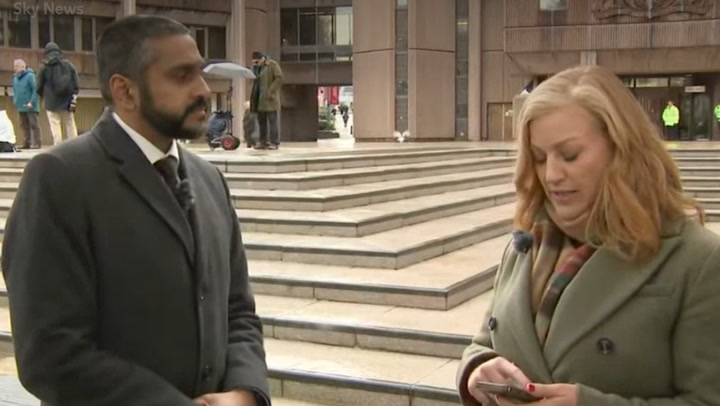

Warning: This video contains distressing content.
Sky News reporter Sarah-Jane Mee broke down in tears reading out evidence from court in the sentencing of Southport killer Axel Rudakubana.
Rudakubana, 18, stabbed and killed Alice da Silva Aguiar, Bebe King and Elsie Dot Stancombe., with a 20cm-long kitchen knife as he ambushed a Taylor Swift-themed dance class in Southport, Merseyside.
Reporting live from outside Liverpool Crown Court on Thursday (23 January), the broadcaster became visibly emotional as she recounted evidence from police arriving at the scene.
The broadcaster then had to step-off camera as her voice broke.
NewsBeat
Hamas attack survivor Yuval Raphael to represent Israel

Culture reporter
 Eurovision/Tal Givoni
Eurovision/Tal GivoniYuval Raphael, who survived the 7 October attack in 2023, has been chosen to represent Israel at this year’s Eurovision Song Contest.
Raphael, 24, was at the Nova musical festival when Hamas attackers killed 360 young partygoers and took 40 more hostage.
The amateur singer was attending with friends and says she survived by hiding under dead bodies inside a bomb shelter for eight hours.
Raphael has been sharing her story while competing on Israeli talent show HaKokhav HaBa (The Next Star) and winning it means she gets to compete at Eurovision in Basel, Switzerland in May.
 Getty Images
Getty ImagesShe said after winning the show: “I can’t explain how excited and ready I am! Thank you for giving me this huge honour and trusting me to represent my country on the grand Eurovision stage in Switzerland.”
Raphael, who says she still has shrapnel in her head and leg from the festival attack, only began singing professionally last year.
During the final of the music competition, she sang a version of ABBA’s Dancing Queen, dedicating it to “all the angels” who were killed at the festival.
She also told viewers that “music is one of the strongest ingredients in my healing process” during the show.
Raphael, who is fluent in English and French as well as Hebrew, has taken part in advocacy for Israel over the last year, including speaking to the UN Human Rights Council about her experience of surviving the attack.
Her official song will be revealed in the coming weeks by Israeli public broadcaster Kan, according to the Eurovision Song Contest website.
Last year’s winner of The Next Star, Eden Golan, represented Israel at Eurovision with Hurricane, which came fifth in the competition.
The show previously selected Netta, who won Eurovision in 2018 and Noa Kirel, who came third in 2023.
Golan’s Eurovision entry was met with criticism, as it was Israel’s first time performing at Eurovision since the outbreak of its most recent war in the Middle East.
Her team were also forced to alter the lyrics and name of Golan’s song – from October Rain to Hurricane – after it was seen to break rules on political neutrality.
There were several campaigns to block Israel from taking part altogether, but the European Broadcasting Union (EBU), which hosts the event, ruled Israel was allowed to compete.
Golan was booed whilst performing at a dress rehearsal for the competition, which took place in Malmo, Sweden and confined to her hotel room when she wasn’t performing, due to threats of harm to the Israeli delegation.
Israel and Gaza are currently upholding a ceasefire after 15 months of fighting, which began in October 2023 after Hamas gunmen breached Israel’s Gaza perimeter fence at multiple locations and attacked nearby Israeli communities, IDF bases and a music festival.
About 1,200 people were killed and 251 were taken hostage.
The IDF responded by launching an air and ground campaign in Gaza, during which more than 47,100 Palestinians have been killed, according to the territory’s Hamas-run health ministry.
Politics
Peer warns of ‘catastrophe’ waiting to happen amid worrying spate of fires in Westminster
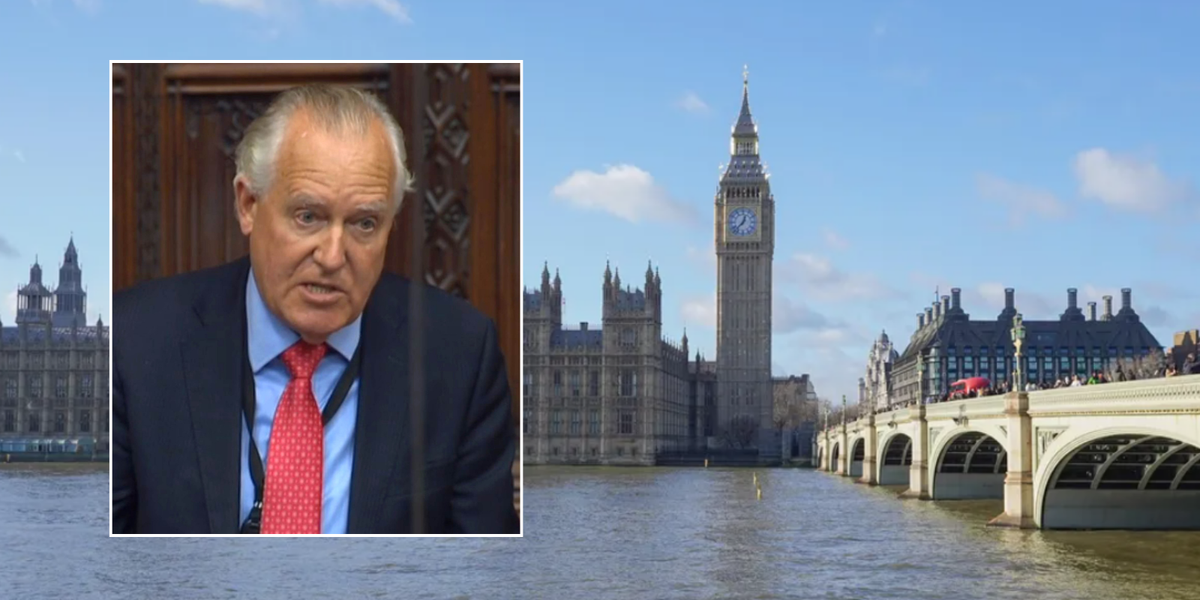
A Labour peer has warned that the Palace of Westminister could be at risk of “catastrophe” after a worrying number of fires over the last decade.
Fire has broken out 45 times in Westminster over the last 10 years, latest figures show.
Labour former cabinet minister Lord Hain said that he fears the site could become a “Notre Dame inferno incubating”, referring to the blaze that devastated the famous cathedral in Paris in 2019.
He criticised the numerous delays that have plagued a multibillion renovation project aimed at revamping the Houses of Parliament.
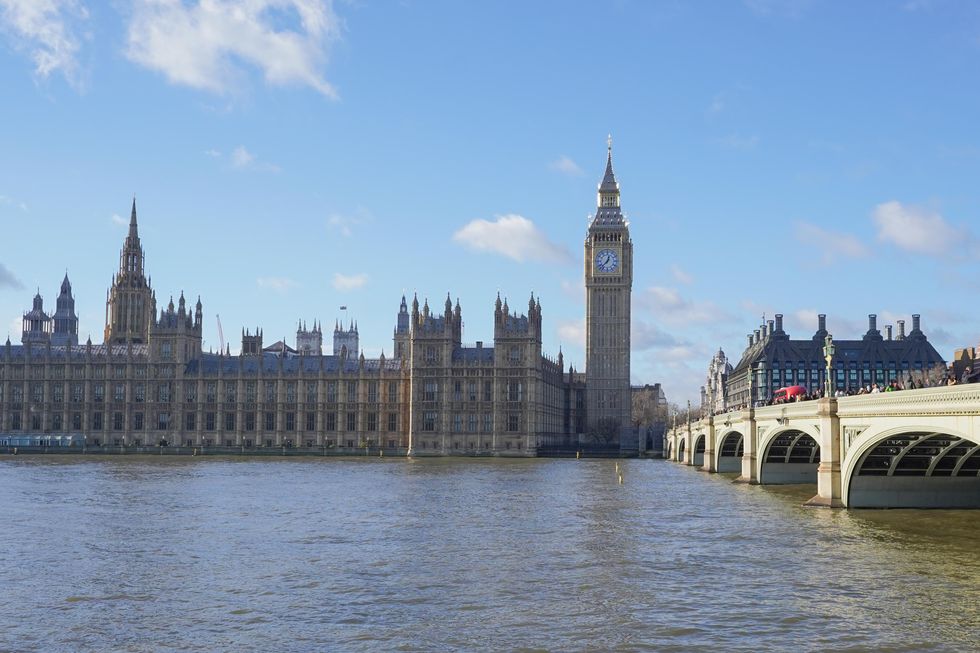
Lord Hain said Westminster is a ‘catastrophe’ waiting to happen
GETTY
Hain, who obtained the breakdown of incidents in Parliament, said the “prevarication and delay” could have “catastrophic consequences”.
Upon learning of the number of fires through a written parliamentary question, Hain said he was “horrified”.
The peer, who served as Commons leader for two years during his time as an MP, said: “I am horrified and these fires demonstrate that there’s a Notre Dame inferno incubating in the palace.
“Parliament decided years ago to a full decant for the proper restoration and renewal of the whole precious world heritage site.
FIRE LATEST:
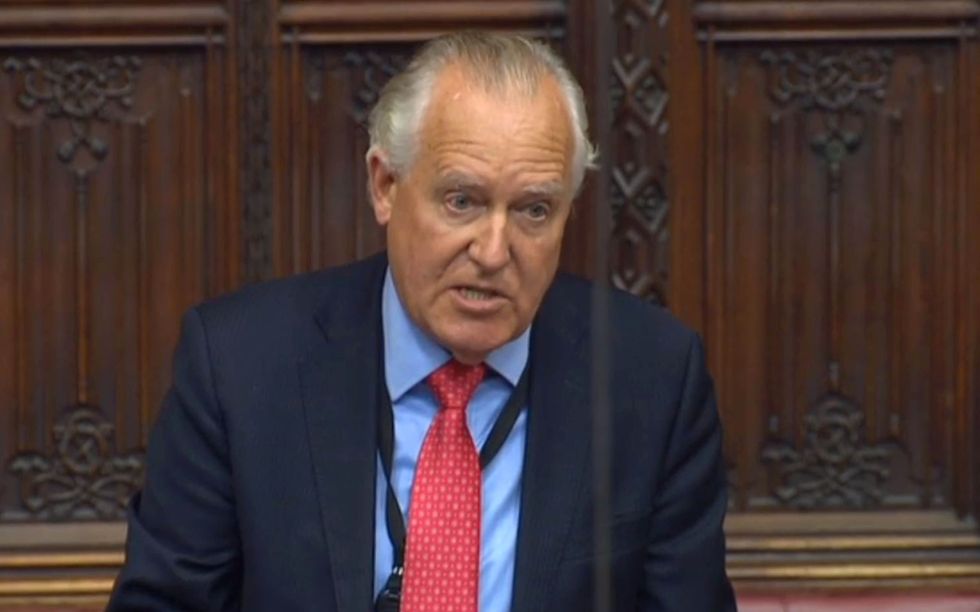
Hain, who obtained the breakdown of incidents in Parliament, said the ‘prevarication and delay’ could have ‘catastrophic consequences’
PA
“But ever since then, there has been prevarication and delay which could well have catastrophic consequences.”
Proposals for the multibillion-pound restoration will not be published until the end of 2025.
They will include plans for three options; These are either a full decant of both Houses, the Commons chamber remaining in “various locations” within the Palace or a much cheaper “enhanced maintenance … rolling programme of works”.
Historic England has previously said that the work could last 43 years and cost more than £20billion.

He said the site could become a ‘Notre Dame inferno incubating’, referring to the blaze that devastated the famous cathedral in Paris in 2019
Getty
The public body said that the project would require nearly 3,000 specialist workers each year, devouring the UK’s supply of plasters and window experts.
Carpenters and joiners will also be in demand, Historic England’s report said.
A spokesman for UK Parliament said: “Work is already happening across the parliamentary estate to ensure the safety of those working here and visiting, including refurbishment of historic office buildings and fire safety improvements such as fire door upgrades, compartmentation, fire safety signage and a high-pressure water mist system.
“We remain on track to bring costed proposals for the restoration of the Palace of Westminster to both Houses by the end of the year detailing costs, timescales, risks and benefits of three delivery options, all of which represent a significant, multibillion-pound investment in the palace.”
-

 Fashion8 years ago
Fashion8 years agoThese ’90s fashion trends are making a comeback in 2025
-

 Entertainment8 years ago
Entertainment8 years agoThe Season 9 ‘ Game of Thrones’ is here.
-

 Fashion8 years ago
Fashion8 years ago9 spring/summer 2025 fashion trends to know for next season
-

 Entertainment8 years ago
Entertainment8 years agoThe old and New Edition cast comes together to perform You’re Not My Kind of Girl.
-

 Sports8 years ago
Sports8 years agoEthical Hacker: “I’ll Show You Why Google Has Just Shut Down Their Quantum Chip”
-
Business8 years ago
Uber and Lyft are finally available in all of New York State
-
Entertainment8 years ago
Disney’s live-action Aladdin finally finds its stars
-
Sports8 years ago
Steph Curry finally got the contract he deserves from the Warriors
-
Entertainment8 years ago
Mod turns ‘Counter-Strike’ into a ‘Tekken’ clone with fighting chickens
-
Fashion8 years ago
Your comprehensive guide to this fall’s biggest trends











You must be logged in to post a comment Login